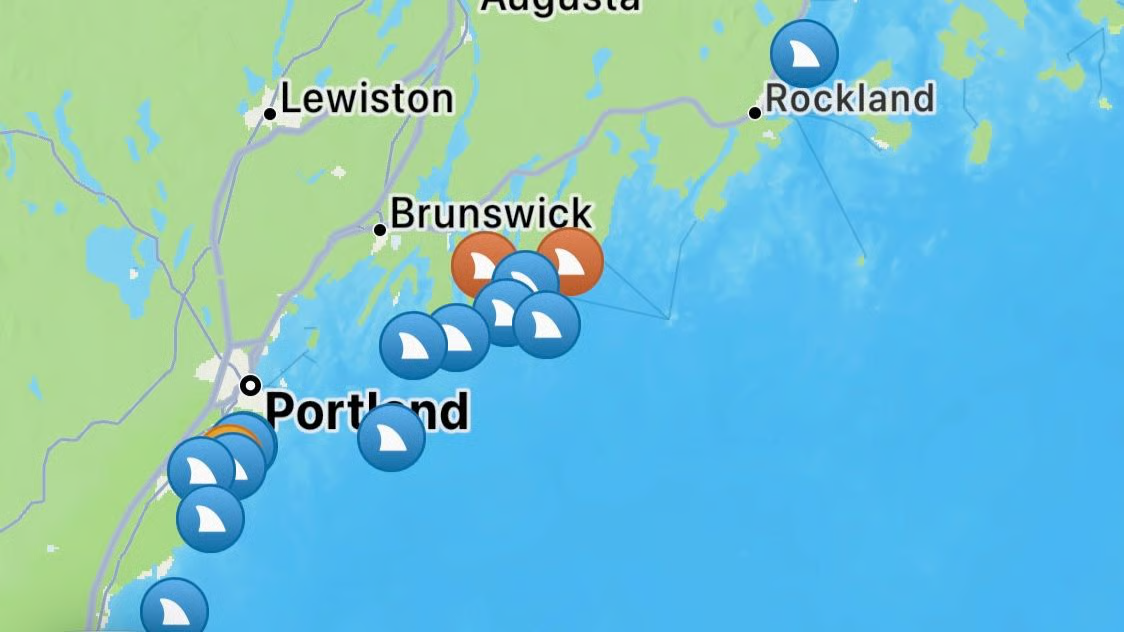John Chisholm has been interested in sharks as long as he can remember. Growing up in Plymouth, Mass. in the 1970s, he spent a lot of time searching for great whites on his dad’s commercial fishing boat.
An adjunct scientist at the New England Aquarium’s Anderson Cabot Center for Ocean Life, Chisholm wasn’t the first in his family to take an interest in great white sharks. In 1921, Chisholm’s great-great grandfather caught white sharks on Prince Edward Island in mackerel nets while working as a lighthouse keeper.
Chisholm spent summers on Prince Edward Island as a kid and heard that story from his grandparents. Now, he says there’s scientific evidence, including fossil shark teeth, that white sharks have long been swimming in northern waters.
“White sharks have always been here. They predate colonization by Europeans,” said Chisholm. “So it’s kind of frustrating when you see people saying they’re now moving into Canadian waters. They’ve always been in Canadian waters. They’ve always been in Maine waters.”
The presence of sharks are an indicator of an ecosystem’s good health, according to shark biologist Kyle Oliveira, a Ph.D. candidate at the University of Maine and Bigelow Laboratory for Ocean Sciences. Between the late 1800s and mid 1900s, the white shark population took a hit due to overfishing, meaning there were less recorded sightings of white sharks along the East Coast.
Thanks to protection measures like the Shark Finning Prohibition Act of 2000 and Shark Conservation Act of 2010, which make it illegal to remove shark fins from sharks at sea and promote sustainable shark management, those who track white sharks are beginning to see the populations recover.
As with any predator, sharks will tend to go where the food is. That could be one factor driving the sightings reported in Casco Bay in July. Both Chisholm and Oliveira pointed to a high concentration of striped bass in the Gulf of Maine, which is a source of prey for sharks.
“Everybody thinks the sharks are here for seals,” Chisholm said. While catching a seal is a “metabolic windfall” full of the lipid-rich nutrients adult sharks need, the predators have plenty of other food sources, too. Juvenile and sub-adult sharks tend to feed on schools of fish, according to Oliveira, who said recent research has found younger sharks are often the ones visiting Maine.
When it comes to finding food, Oliveira said convenience is key. “White sharks are really lazy animals, and they try and get whatever meal is gonna be easiest for them to catch,” Oliveira said. One favorite is a floating whale carcass because it provides easy access for sharks to chomp off pieces of blubber, another source of lipids.
Independent of shark population numbers, technology may be another driver of reported white shark sightings. When Chisholm started tracking white sharks in the Atlantic in the late 1970s, he’d hear about sightings second or third hand. He’d spend weeks, months, or occasionally years tracking down witnesses to interview them about what they thought they saw, being careful not to ask leading questions that would sway the answers one way or another.
“In 1985 I might have only had three sightings for that year. That doesn’t mean there were only three white sharks. It just means I tracked down three people that saw them,” Chisholm said.
Nowadays, Chisholm opens up social media to track sightings across videos and photos posted to Instagram and X. Many of those sightings turn out to be basking sharks rather than white sharks, but the information contributes to data on multiple shark species and their behavior throughout New England.
Through his role at the New England Aquarium, Chisholm is also responsible for verifying shark sightings reported on the Sharktivity app. The app is a form of citizen science, allowing witnesses to contribute to a growing database that helps inform work done by researchers across the region.

As of July 31 this year, there have been 15 confirmed sightings of white sharks off of Maine’s coast, with one sighting reported as far north as Camden.
In addition to reporting shark sightings on the app, Chisholm recommended that those who spot a shark contact their local harbor masters with the location and time of the sighting.
Doing so can help spread awareness and reduce paranoia. One rule of thumb is to avoid swimming with the bait, Chisholm said. Beyond that, Oliveira encouraged beachgoers to remember that the ocean is home for sharks.
“It’s a sign of a healthy, productive ecosystem, so having white sharks around is a really good thing,” Oliveira said.
As the climate changes, researchers like Oliveira are working to understand how white sharks will be affected. Sea surface temperatures in the Gulf of Maine are warming faster than 99% of the global ocean as a result of climate change, yet sharks can regulate their internal body temperature and find suitable habitat in waters ranging from 37-89 degrees fahrenheit.
What’s unclear, Oliveira said, is how lower levels of the food chain will fare under changing conditions. Impacts there could eventually work their way up to white sharks at the top.







